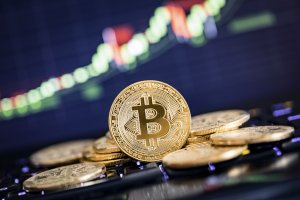Bitcoin: A bubble bursting or a currency maturing?
Billionaire Mark Cuban called the crypto crash “the great unwind”. Another billionaire, Elon Musk, recently accused it of being “a threat to the environment” and banned it as payment for Tesla cars

Apart from falling out of favour with some of its wealthy supporters, bitcoin suffered another blow this week when J.P. Morgan bitcoin expert and analyst Nikolaos Panigirtzoglou published a report, predicting a further price crash. Panigirtzoglou stated that bitcoin could still hit $145,000 in the long term, however, in the short term, its price could be vulnerable to new lows.
It is fair to say that this has been a rocky month for the number one cryptocurrency. The crypto bloodbath in May caused bitcoin to plummet to less than half its value, marking the worst calendar month in bitcoin’s 12-year history. It went from an all-time high of nearly $65,000 in April down to $32,000 in May, sparking rumours that the bitcoin could be a bubble that might be popping. Adding insult to injury, around the same time China banned crypto exchanges in an effort to regulate cryptocurrencies.
The reality for bitcoin isn’t black and white
The cryptocurrency markets are volatile by nature and the truth is, that nobody knows what the future holds for bitcoin. At the time of writing, its price is 37,524. In fact, its recent price fluctuations are like Elon Musk’s Twitter whims: you can never be sure what direction they are heading next. Right after slamming the currency, the Tesla boss softened his attitude saying that “the company “has not sold any bitcoin”.
As soon as a wave of positive tweets comes in-which, in theory, could happen any moment-we might see the price of bitcoin shooting up again. Bitcoin cheerleaders and believers make headlines regularly. Last week the founder of the world’s largest hedge fund, Ray Dalio revealed that he owns some bitcoin and said that “Personally, I’d rather have bitcoin than a bond”. Dalio has been changing his mind about bitcoin. He has previously tweeted that “Unlike gold, which is the third-highest reserve asset that central banks own, I can’t imagine central banks, big institutional investors, businesses or multinational companies using [bitcoin].
There are others who argue against a potential bitcoin downfall. According to Wouter Witvoet, CEO and founder of DeFi Technologies, the price of bitcoin not only will recover but will exceed the previous all-time highs.
“Volatility is expected in cryptocurrencies or for any new emerging technology or asset class,” Witvoet recently said. “Pay attention to the adoption rate of the networks. If network participants continue to grow over time, the value of the network increases. “
Bitcoin’s current tumble may not matter that much in the long haul
Bitcoin’s current price crash looks bad, but it’s still 10 times the price of its 2020 lows. According to Sebastian Quinn-Watson, Founder at Yieldly Finance, “In a world where Bitcoin’s current price is still 10x the price from its 2020 lows, we don’t see this dip as a particular concern.”
Moreover, as Quinn-Watson explains, big drops will no longer be possible when the capitalization of bitcoin is so large that retail sales will not affect the exchange rate.
For certain bitcoin analysts, such as Jesse Powell, the CEO of Kraken, bitcoin’s value could reach one million within the next decade, and potentially even “go to infinity”. But he also said that prices can “move up or down 50% on any given day”. The bottom line is, that the realities for cryptocurrencies are far more complex than a bad day, a bad week, or even a bad month.
For some investors, the recent fluctuations in the price of bitcoin are not a sign of a bubble bursting, but a currency maturing.
What are the main challenges for bitcoin?
Despite getting positive vibes from various public personas, cryptocurrencies might have a long path ahead to be widely accepted.. Cryptocurrencies exist in unregulated terrain and are known for volatility. This is why countries such as China, India and Turkey have taken steps to ban cryptocurrencies and potentially even fine anyone who is trading or holding such digital assets. Yet they have the support of a social-media-savvy younger generation of investors who have bought into the idea of democratization of finance.
Democratizing finance sounds noble, but it also means decentralization. Governments do not monitor cryptocurrency prices, while at the same time there are several regulatory issues. Moreover, high volatility is inevitable as the price depends on media coverage and popular support.
Gaining widespread acceptance and becoming more mainstream is another challenge for bitcoin. Currently, there are several companies that accept bitcoin including Microsoft, Burger King, KFC and CheapAir, as well as online dating network Badoo and global charity organization Save the Children. If you can eat a burger, buy an air ticket or even donate to charity using bitcoin this could be a positive sign that cryptocurrency is on the right path to wider public acceptance. However, this has not happened yet.
In this sense, many risk-averse investors might still not be ready for bitcoin domination. As the J.P Morgan report mentioned: “There is little doubt that the boom and bust dynamics of the past weeks represent a setback to the institutional adoption of crypto markets and in particular of Bitcoin and Ethereum. We note that the mere rise in volatility, especially relative to gold, is an impediment to further institutional adoption as it reduces the attractiveness of digital gold vs. traditional gold in institutional portfolios”.
It could mean that in the short term, some investors would still opt for safe-haven assets-at least until the crypto winter is over.
The article contains market commentary information, it should not be regarded as investment research or investment advice. Past performance is not a reliable indicator for the future.
CFDs are complex instruments and come with a high risk of losing money rapidly due to leverage. 76.25% of retail investor accounts lose money when trading CFD









